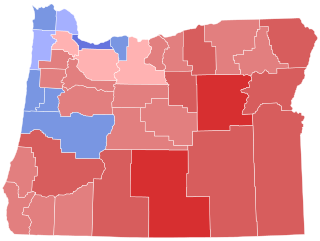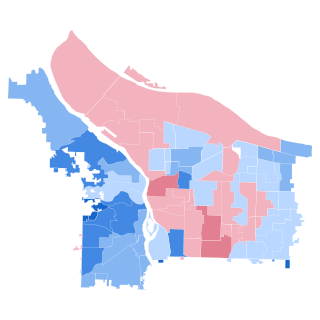
Theodore Ralph Kulongoski is an American politician, judge, and lawyer who served as the 36th Governor of Oregon from 2003 to 2011. A member of the Democratic Party, he served in both houses of the Oregon Legislative Assembly and also served as the state Insurance Commissioner. He was the Attorney General of Oregon from 1993 to 1997 and a justice of the Oregon Supreme Court from 1997 to 2001. Kulongoski has served in all three branches of the Oregon state government.

The 1996 United States Senate elections were held on November 5, 1996, with the 33 seats of Class 2 contested in regular elections. Special elections were also held to fill vacancies. They coincided with the presidential election of the same year, in which Democrat Bill Clinton was re-elected president.

The 1980 United States Senate elections were held on November 4, coinciding with Ronald Reagan's victory in the presidential election. The 34 Senate seats of Class 3 were contested in regular elections. Reagan's large margin of victory over incumbent Jimmy Carter gave a huge boost to Republican Senate candidates, allowing them to flip 12 Democratic seats and win control of the chamber for the first time since the end of the 83rd Congress in January 1955. This was the first time since 1966 that any party successfully defended all their own seats.

The 1966 United States Senate elections were elections on November 8, 1966, for the United States Senate which occurred midway through the second term of President Lyndon B. Johnson. The 33 seats of Class 2 were contested in regular elections. Special elections were also held to fill vacancies. With divisions in the Democratic base over the Vietnam War, and with the traditional mid-term advantage of the party not holding the presidency, the Republicans took three Democratic seats, thereby breaking Democrats' 2/3rds supermajority. Despite Republican gains, the balance remained overwhelmingly in favor of the Democrats, who retained a 64–36 majority. Democrats were further reduced to 63–37, following the death of Robert F. Kennedy in June 1968.

The 2003 Louisiana gubernatorial election was held on November 15, 2003, to elect the governor of Louisiana. Incumbent Republican governor Mike Foster was not eligible to run for re-election to a third term because of term limits established by the Louisiana Constitution.

The first round of the Louisiana House election of 2006 were held on Tuesday, November 7, 2006. The terms of all seven Representatives to the United States House of Representatives will expire on January 3, 2007, and will be put up for contest. The winning candidates will serve a two-year term from January 3, 2007, to January 3, 2009. If necessary, a runoff round will be held on December 9, 2006.

The Democratic Party of Oregon is the Oregon affiliate of the Democratic Party. The State Central Committee, made up of two delegates elected from each of Oregon's 36 counties and one additional delegate for every 15,000 registered Democrats, is the main authoritative body of the party. The party has 17 special group caucuses which also each have representation on the State Central Committee.

The Libertarian Party of Oregon is a political party representing the national Libertarian Party in the U.S. state of Oregon. It is organized as a minor party for state election law, and recognized by the Oregon as a statewide nominating party.
Like many other U.S. states, the politics of Oregon largely concerns regional issues. Oregon leans Democratic as a state, with both U.S. senators from the Democratic party, as well as four out of Oregon's six U.S. Representatives. The Democratic candidate for president has won in Oregon in every election since 1988. Both houses of Oregon's legislative assembly have been under Democratic control since the 2012 elections.
The Independent Party of Oregon (IPO) is a centrist political party in the U.S. state of Oregon with more than 140,000 registrants since its inception in January 2007. The IPO is Oregon's third-largest political party and the first political party other than the Democratic Party and Republican Party to be recognized by the state of Oregon as a major political party.

The 2002 Oregon gubernatorial election took place on November 5, 2002. Incumbent Democrat John Kitzhaber was barred by term limits from seeking a third consecutive term; he later successfully ran again in 2010 and 2014. To replace him, former Oregon Supreme Court Associate Justice Ted Kulongoski won a crowded and competitive Democratic primary, while former State Representative Kevin Mannix emerged from an equally competitive Republican primary. The campaign between Kulongoski and Mannix, who were joined by Libertarian nominee Tom Cox, was close and went down to the wire. Ultimately, Kulongoski eked out a narrow margin of victory over Mannix, which was slightly smaller than Cox's total vote share, allowing Kulongoski to win what would be the first of two terms as governor. As of 2024, this is the last time that Oregon voted for a gubernatorial nominee and a U.S. Senate nominee of different political parties.

The 2010 Oregon gubernatorial election was held on Tuesday, November 2, 2010 to elect the Governor of Oregon to a four-year term beginning on January 10, 2011. The incumbent governor, Democrat Ted Kulongoski, was ineligible to run due to term limits barring him from being elected to more than two consecutive terms.

The 2012 United States presidential election in Oregon took place on November 6, 2012, as part of the 2012 United States presidential election in which all 50 states plus the District of Columbia participated. Oregon voters chose seven electors to represent them in the Electoral College via a popular vote pitting incumbent Democratic President Barack Obama and his running mate, Vice President Joe Biden, against Republican challenger and former Massachusetts Governor Mitt Romney and his running mate, Representative Paul Ryan.

On November 6, 2012, the U.S. state of Oregon held statewide general elections for four statewide offices, both houses of the Oregon Legislative Assembly, and several state ballot measures.

United States gubernatorial elections were held on November 8, 2022, in 36 states and three territories. As most governors serve four-year terms, the last regular gubernatorial elections for all but two of the seats took place in 2018. The gubernatorial elections took place concurrently with several other federal, state, and local elections, as part of the 2022 midterm elections.

The 2022 Oregon gubernatorial election took place on November 8, 2022, to elect the governor of Oregon. Incumbent Kate Brown took office when fellow Democrat John Kitzhaber resigned on February 18, 2015. She won the subsequent 2016 special election a full term in 2018. Due to term limits, she was unable to run again in 2022.

On May 19, 2020, and November 3, 2020, elections were held in Portland, Oregon, to elect the mayor.

A general election was held in the U.S. state of Oregon on November 3, 2020. Primary elections were held on May 19, 2020.

The 2022 United States Senate election in Oregon was held on November 8, 2022, to elect a member of the United States Senate to represent the state of Oregon. Incumbent Democratic U.S. Senator Ron Wyden, who was first elected in a 1996 special election, ran for a fifth full term. Jo Rae Perkins, who unsuccessfully ran for Oregon's other Senate seat in 2020, won the Republican primary with 33.3% of the vote. The four candidates filing with the Oregon Secretary of State for this election included Chris Henry of the Oregon Progressive Party and Dan Pulju of the Pacific Green Party.

The 2022 United States House of Representatives elections in Oregon were held on November 8, 2022, to elect the six U.S. representatives from the state of Oregon, one from each of the state's six congressional districts. Primaries for these seats were held on May 17, 2022. The elections coincided with the elections and primaries of other federal and state offices.

















